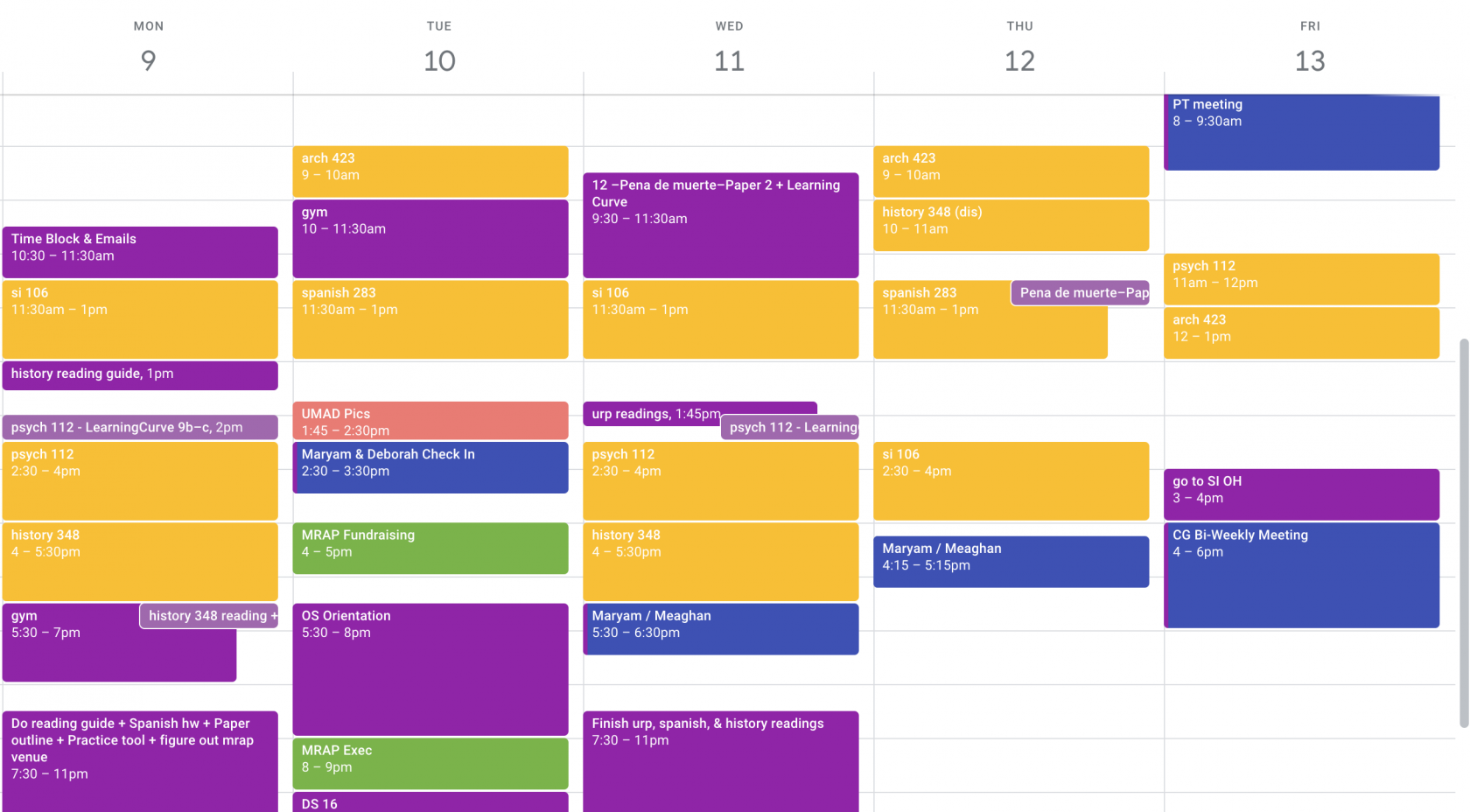Blog
Get the inside scoop about life at U-M and applying to Michigan from current student bloggers, Admissions staff, and guest faculty writers.

Get the inside scoop about life at U-M and applying to Michigan from current student bloggers, Admissions staff, and guest faculty writers.


The Monday morning the week of March 9, I set out to block out my schedule for the week. But after Wednesday afternoon of that week, that idea all fell apart because of an announcement made by the university that all in-person classes would be suspended due to the coronavirus.Two weeks later, as I reflect on this experience after returning home from Ann Arbor, the things I learned through time blocking still remain relevant to my virtual school experience. Even though I didn’t anticipate then, I would later learn just how important it would be to find and stick to a new routine.
For those that don’t know, time blocking is a fancy method used by productivity nerds to block out every hour of the day for the hours that you’re awake. You’ve probably already used some level of time blocking in your daily schedule if you’ve been to class (virtually or physically) during the hours that they’re held or make a mental checklist of what you want to accomplish in the evening. Going into the week, I thought if I wrote out a set plan on Google Calendar, I would hold myself accountable to it. I was falling into a mid-semester slump and I wanted to revitalize my productivity with something new. Mainly, I wanted to hold myself more accountable to completing tasks ahead of time and see if I could free up any wasted time.
Initially, I intended to time block for two weeks – one week to test the method out and another to make changes based on my experiences during the first week so that I could truly give it a fair shot. But before I went home following the university announcement, I experienced a short-but-insightful three full days of time blocking. Within that short time, I still learned a lot about myself in terms of time management.
Before I even went into the week, I realized that just the act of time blocking my schedule was going to be difficult. I already had my classes marked on Google Calendar and had a rough idea of what I wanted to accomplish between Monday and Wednesday, but after Wednesday, I didn’t have any concrete deadlines for Thursday or Friday since the bulk of my assignments for that week were due on Wednesday. So I decided to leave the free hours blank until Wednesday when I would have a better idea of what I needed to accomplish later in the week (since we didn’t have class on Thursday and Friday, I didn’t end up updating my calendar).
But before classes were canceled on March 11, I was able to pretty much stick to my schedule. On Monday, my day went as planned, except I skipped the gym because some problem came up that had to do with one of the student organizations I belong to, the Michigan Refugee Assistance Program, after my 4 p.m. class. The second day, I also adhered to everything I had planned, since most of it was meetings for work, student organizations, and an event for my major. Wednesday was when I realized that I didn’t like sticking to time blocking. It wasn’t that I didn’t do work in the time I had set; it was that I didn’t do the tasks I had planned in the order I said I was going to do them. This wasn’t surprising, but it did make me realize why I never tried strict time blocking before. In general, I tend to do the tasks I feel like doing first and go from there. On Thursday and Friday, classes were of course canceled.
Ultimately, what I took from these three days of time blocking is that there is no magical method that will enhance your productivity unless you are genuinely committed. As much as I wanted to improve my productivity, I didn’t actually want it bad enough to change the way I already went about my day. I also wasn’t able to anticipate other tasks that came up and didn’t have complete control over my time – like the problem with my student organization or the amount of time meetings would actually take. For the time I did have control over, blocking out times to study was an effective, but unnecessary tool. Lastly, during this particular week, I couldn’t have anticipated that classes would have ended on Thursday (although obviously I assumed the university would have to respond eventually).
As I begin my second week of online classes (the week of 3/23) after a week-long hiatus from time blocking, I’ve slowly adjusted to a new routine at home. Most of my classes are held at the same time over BlueJeans, although my Psych and Urban Planning lectures are now structured as self-study courses and we can watch uploaded lectures at our leisure, which has been a nice change of pace. While this has freed up some time, working at home also demands greater discipline. Waking up before 9 a.m. now seems next to impossible, as does doing any kind of work after dinner since the rest of my family works remotely and “logs-off” in the afternoon. Although I’ve adapted to my new environment, I’d like to add a little more structure to my day and start to loosely planning out my day on Google Calendar again. Now more than ever, something normal and routine seems good.

Maryam Masood (she/her) is a senior in the College of Literature, Science, and the Arts majoring in Organizational Studies. During the year, she keeps busy managing the Michigan Refugee Assistance Program and working as a trainer at Rec Sports. Outside of class and work, she can most likely be found making another cup of coffee, procrastinating at the CCRB, or rewatching Kim's Convenience on Netflix.